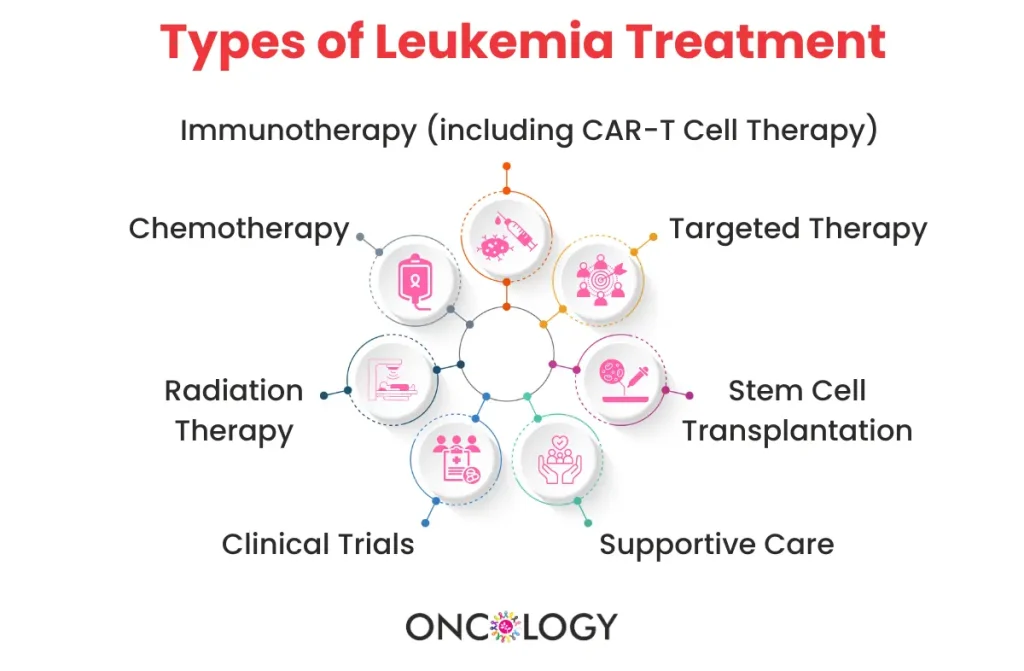Leukemia treatment in Chennai offers advanced medical solutions for individuals diagnosed with this challenging condition. Chennai, known for its world-class healthcare facilities, provides patients with access to cutting-edge treatments and expert medical professionals. This article explores the various aspects of leukemia treatment in Chennai, including symptoms and risks, diet and nutrition, prevention and diagnosis.
Symptoms and Risk Factors of Leukemia
Leukemia, a type of cancer that affects blood and bone marrow, presents with various symptoms and risk factors. Understanding these is crucial for early detection and effective leukemia treatment in Chennai.

Common Symptoms
- Fatigue and Weakness: Persistent tiredness that doesn’t improve with rest.
- Frequent Infections: Caused by a compromised immune system.
- Easy Bruising and Bleeding: Including frequent nosebleeds and bleeding gums.
- Swollen Lymph Nodes: Commonly found in the neck, armpits, or groin.
- Bone Pain: Often felt in the arms or legs.
Risk Factors
- Genetic Predisposition: Family history of leukemia.
- Exposure to Radiation: Previous radiation therapy or high levels of radiation exposure.
- Chemical Exposure: Contact with certain chemicals like benzene.
- Smoking: Increases the risk of developing leukemia.
- Previous Cancer Treatments: Chemotherapy and radiation therapy for other cancers.
Recognizing these symptoms and risk factors early can lead to prompt leukemia treatment in Chennai, improving outcomes and survival rates.
Diet and Nutrition
Diet and nutrition play a significant role in supporting patients undergoing leukemia treatment in Chennai. A balanced diet helps maintain strength and energy, manage side effects, and promote overall well-being.
Essential Nutrients
- Proteins: Crucial for repairing tissues and maintaining muscle mass. Sources include lean meats, eggs, and legumes.
- Carbohydrates: Provide energy. Whole grains, fruits, and vegetables are excellent choices.
- Fats: Healthy fats from nuts, seeds, and avocados support cellular function.
- Vitamins and Minerals: Essential for immune support. Focus on a variety of fruits and vegetables for a wide range of nutrients.
Dietary Tips
- Hydration: Drink plenty of fluids to stay hydrated, especially during treatment.
- Avoid Processed Foods: Focus on whole foods to ensure maximum nutrient intake.
- Consult a Dietitian: For personalized dietary advice tailored to your specific needs and treatment plan.
Proper nutrition supports the body during leukemia treatment in Chennai, aiding in recovery and enhancing the effectiveness of medical treatments.
Prevention and Early Detection
While not all cases of leukemia can be prevented, certain lifestyle choices and regular medical check-ups can reduce the risk and facilitate early detection, making leukemia treatment in Chennai more effective.
Preventive Measures
- Avoid Smoking: Significantly reduces the risk of leukemia.
- Limit Chemical Exposure: Avoiding exposure to harmful chemicals like benzene.
- Healthy Lifestyle: Regular exercise and a balanced diet support overall health and reduce cancer risk.
- Regular Medical Check-Ups: Early detection through routine blood tests and medical examinations can lead to early intervention.
Early detection and preventive measures are key components of successful leukemia treatment in Chennai.
Diagnosis
Accurate diagnosis is essential for effective leukemia treatment in Chennai. It involves a series of tests and evaluations to determine the type and stage of leukemia.
Diagnostic Procedures
- Physical Examination: Initial assessment of symptoms and overall health.
- Blood Tests: Complete blood count (CBC) to check for abnormal levels of white blood cells, red blood cells, and platelets.
- Bone Marrow Biopsy: To examine the bone marrow for leukemia cells.
- Genetic Tests: Identify specific genetic mutations associated with different types of leukemia.
- Imaging Tests: CT scans, MRIs, and X-rays to assess the spread of the disease.
Importance of Accurate Diagnosis
- Tailored Treatment Plans: Ensures that the treatment is specific to the type and stage of leukemia.
- Monitoring Progress: Helps in tracking the effectiveness of treatment and making necessary adjustments.
- Improved Outcomes: Accurate diagnosis leads to more effective treatment strategies and better patient outcomes.
Proper diagnosis is the foundation of successful leukemia treatment in Chennai, guiding the medical team in developing the most effective treatment plan.
Leukemia Treatment in Chennai
While leukemia are distinct types of blood cancers, their treatments often overlap. Chennai offers comprehensive alongside leukemia treatment, providing a holistic approach to blood cancer care.
Treatment Options
- Chemotherapy: Uses drugs to kill cancer cells or stop their growth.
- Radiation Therapy: Uses high-energy rays to target and destroy cancer cells.
- Targeted Therapy: Uses drugs that specifically target cancer cells without harming normal cells.
- Immunotherapy: Boosts the body’s immune system to fight cancer.
Comprehensive Care
- Multidisciplinary Approach: Involves oncologists, hematologists, radiologists, and other specialists.
- Supportive Care: Includes pain management, nutritional support, and psychological counseling.
- Patient-Centered Treatment: Focuses on the individual needs and preferences of each patient.
Leukemia cancer treatment in Chennai is integrated with leukemia treatment to ensure comprehensive and effective care for patients with blood cancers.
Conclusion
Leukemia treatment in Chennai combines advanced medical technology, expert healthcare professionals, and a patient-centered approach to provide effective and compassionate care. By understanding the symptoms and risks, maintaining proper diet and nutrition, focusing on prevention and early detection, ensuring accurate diagnosis, and integrating Leukemia cancer treatment, Chennai offers a holistic approach to managing leukemia.

